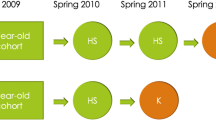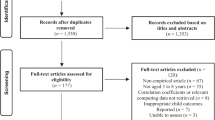Abstract
Objectives
The importance of breastfeeding exposure and children’s development of self-regulation, independently, are well established. Each of these domains also has been linked to better cognitive development and academic achievement in children. However, little is known about how breastfeeding affects development of early self-regulation skills or whether self-regulation mediates the relationship between breastfeeding and academic achievement, particularly for disadvantaged children. This study examined breastfeeding exposure, self-regulation, and academic achievement in kindergarten among a population of children who previously attended Head Start.
Methods
Children were recruited from Head Start classrooms in the Pacific Northwest. Breastfeeding exposure was assessed via parent report. Children’s self-regulation (Day Night Stroop, Dimensional Change Card Sort, Head-Knees-Toes-Shoulders-Revised) and academic achievement [Letter-Word Identification and Applied Problems subtests of Woodcock Johnson Tests of Achievement (English) or the Batería III Woodcock-Muñoz (Spanish)] were directly assessed in fall and spring of kindergarten. Regressions were performed using Stata v14.1 and included breastfeeding exposure as the primary independent variable, controlling for child age, sex, and language spoken.
Results
Of the 246 children, 56% were reported as White, 34% Latino/a, 4% African American, and 6% other; 83% were ever exposed to breastfeeding. Breastfeeding exposure was predictive of both fall kindergarten academic achievement (emergent math/literacy scores) and self-regulation (p < 0.05) and related to higher math performance in the spring of kindergarten, which was associated with stronger self-regulation in the fall (p = 0.04).
Conclusions
These findings extend our understanding of the positive effects of breastfeeding exposure on children’s development and support breastfeeding promotion, particularly for children at risk of academic difficulty.


Similar content being viewed by others
References
Angelsen, N. K., Vik, T., Jacobsen, G., & Bakketeig, L. S. (2001). Breast feeding and cognitive development at age 1 and 5 years. Archives of Disease in Childhood, 85(3), 183–188. https://doi.org/10.1136/adc.85.3.183
Barnett, W. S., & Lamy, C. E. (2013). Achievement gaps start early. Closing the opportunity gap: What America must do to give every child an even chance. Oxford University Press.
Belfort, M. B., Rifas-Shiman, S. L., Kleinman, K. P., Guthrie, L. B., Bellinger, D. C., Taveras, E. M., Gillman, M. W., & Oken, E. (2013). Infant feeding and childhood cognition at ages 3 and 7 years: Effects of breastfeeding duration and exclusivity. JAMA Pediatrics, 167(9), 836–844. https://doi.org/10.1001/jamapediatrics.2013.455
Bernier, A., Carlson, S. M., & Whipple, N. (2010). From external regulation to self-regulation: Early parenting precursors of young children’s executive functioning. Child Development, 81(1), 326–339. https://doi.org/10.1111/j.1467-8624.2009.01397.x
Blair, C., & Ursache, A. (2011). A bidirectional theory of executive functions and self-regulation (2nd ed.). Guilford Press.
Brody, G., Stoneman, Z., & McCoy, J. (1994). Contributions of protective and risk factors to literacy and socioemotional competency in former head start children attending kindergarten. Early Childhood Research Quarterly, 9(3–4), 407–425.
Cameron, C. E., Kim, H., Duncan, R., Becker, D., & McClelland, M. M. (2019). Bidirectional and co-developing associations of cognitive and academic skills during kindergarten. Journal of Applied Developmental Psychology, 62, 135–144.
Cameron, C. A., Pinto, G., Stella, C., & Hunt, A. K. (2020). A Day in the Life of young children drawing at home and at school. International Journal of Early Years Education, 28(1), 97–113.
Centers for Disease Control and Prevention. National Center for Chronic Disease Prevention and Health Promotion, Division of Nutrition, Physical Activity, and Obesity.Data, Trend and Maps [online]. Retrieved May 13, 2021, from, https://www.cdc.gov/nccdphp/dnpao/data-trends-maps/index.html.
Diamond, A., Barnett, W. S., Thomas, J., & Munro, S. (2007). Preschool program improves cognitive control. Science, 318(5855), 1387–1388. https://doi.org/10.1126/science.1151148
Duncan, S. E., & De, A. E. A. (1998). PreLAS2000 assessment kit. CTB/McGraw-Hill.
Evans, G. W., & Rosenbaum, J. (2008). Self-regulation and the income-achievement gap. Early Childhood Research Quarterly, 23, 504–514.
Gerstadt, C. L., Hong, Y. J., & Diamond, A. (1994). The relationship between cognition and action: Performance of children 3 1/2-7 years old on a Stroop-like day-night test. Cognition, 53(2), 129–153. https://doi.org/10.1016/0010-0277(94)90068-x
Gibbs, B. G., Forste, R., & Lybbert, E. (2018). Breastfeeding, parenting, and infant attachment behaviors. Maternal and Child Health Journal, 22(4), 579–588. https://doi.org/10.1007/s10995-018-2427-z
Gómez-Sanchiz, M., Cañete, R., Rodero, I., Baeza, J. E., & Avila, O. (2003). Influence of breast-feeding on mental and psychomotor development. Clinical Pediatrics (phila), 42(1), 35–42. https://doi.org/10.1177/000992280304200106
Haskins, R., & Rouse, C. (2005). Closing Achievement Gaps. Brookings Institution.
Horwood, L. J., & Fergusson, D. M. (1998). Breastfeeding and later cognitive and academic outcomes. Pediatrics, 101(1), E9. https://doi.org/10.1542/peds.101.1.e9
Huang, J., Peters, K. E., Vaughn, M. G., & Witko, C. (2014). Breastfeeding and trajectories of children’s cognitive development. Developmental Science, 17(3), 452–461. https://doi.org/10.1111/desc.12136
McClelland, M. M., & Cameron, C. E. (2011). Self-regulation and academic achievement in elementary school children. New Directions for Child and Adolescent Development, 2011(133), 29–44. https://doi.org/10.1002/cd.302
McClelland, M. M., & Cameron, C. E. (2012). Self-regulation in early childhood: Improving conceptual clarity and developing ecologically valid measures. Child Development Perspectives, 6(2), 136–142.
McClelland, M. M., Cameron, C. E., Duncan, R., Bowles, R. P., Acock, A. C., Miao, A., & Pratt, M. E. (2014). Predictors of early growth in academic achievement: The head-toes-knees-shoulders task. Frontiers in Psychology, 5, 599. https://doi.org/10.3389/fpsyg.2014.00599
McClelland, M., Ponitz, C., Messersmith, E., & Tominey, S. (2010). The handbook of life-span development: Cognition, biology, and methods (Vol. 1). Wiley.
McClelland, M. M., Tominey, S. L., Schmitt, S. A., et al. (2019). Red light, purple light! results of an intervention to promote school readiness for children from low-income backgrounds. Frontiers in Psychology. https://doi.org/10.3389/fpsyg.2019.02365
McCrory, C., & Layte, R. (2011). The effect of breastfeeding on children’s educational test scores at nine years of age: Results of an Irish cohort study. Social Science and Medicine, 72(9), 1515–1521. https://doi.org/10.1016/j.socscimed.2011.03.002
Mosca, F., & Gianni, M. L. (2017). Human milk: Composition and health benefits. Pediatria Medica e Chirurgica, 39(2), 155. https://doi.org/10.4081/pmc.2017.155
Muñoz-Sandoval, A. F., Woodcock, R. W., McGrew, K. S., Mather, N., & Ardoino, G. (2009). Batería III Woodcock-Muñoz, (Vol. 3). Ciencias Psicológicas, pp. 245–246.
Oddy, W. H., Li, J., Whitehouse, A. J., Zubrick, S. R., & Malacova, E. (2011). Breastfeeding duration and academic achievement at 10 years. Pediatrics, 127(1), e137-145. https://doi.org/10.1542/peds.2009-3489
Posner, M. I., & Rothbart, M. K. (2000). Developing mechanisms of self-regulation. Development and Psychopathology, 12, 427–441.
Quinn, P. J., O’Callaghan, M., Williams, G. M., Najman, J. M., Andersen, M. J., & Bor, W. (2001). The effect of breastfeeding on child development at 5 years: A cohort study. Journal of Paediatrics and Child Health, 37, 465–469.
Rainelli, S., Shearer, R., Fernandez, V. A., Greenfield, D., & López, M. (2017). Validity of the first two subtests of the preschool language assessment scale as a language screener for Spanish-speaking preschool children. Early Childhood Research Quarterly, 38, 10–22. https://doi.org/10.1016/j.ecresq.2016.08.001
Reardon, S. F. (2013). The Widening Income Achievement Gap. In (Vol. 70): Educational Leadership, pp. 10–16.
Rhoades, B. L., Greenberg, M. T., & Domitrovich, C. E. (2009). The contribution of inhibitory control to preschoolers’ social-emotional competence. Journal of Applied Developmental Psychology, 30(3), 310–320. https://doi.org/10.1016/j.appdev.2008.12.012
Rimm-Kaufman, S. E., Curby, T. W., Grimm, K. J., Nathanson, L., & Brock, L. L. (2009). The contribution of children’s self-regulation and classroom quality to children’s adaptive behaviors in the kindergarten classroom. Developmental Psychology, 45(4), 958–972. https://doi.org/10.1037/a0015861
Sektnan, M., McClelland, M. M., Acock, A., & Morrison, F. J. (2010). Relations between early family risk, children’s behavioral regulation, and academic achievement. Early Child Research Quarterly, 25(4), 464–479. https://doi.org/10.1016/j.ecresq.2010.02.005
Wanless, S. B., McClelland, M. M., Acock, A. C., Ponitz, C. C., Son, S. H., Lan, X., Morrison, F. J., Chen, J.-L., Chen, F.-M., Lee, K., Sung, M., & Li, S. (2011). Measuring behavioral regulation in four societies. Psychological Assessment, 23(2), 364–378. https://doi.org/10.1037/a0021768
Woodcock, R. W., McGrew, K. S., & Mather, N. (2001). Woodcock-Johnson III tests of achievement.
Zelazo, P. D. (2006). The Dimensional Change Card Sort (DCCS): A method of assessing executive function in children. Nature Protocols, 1(1), 297–301. https://doi.org/10.1038/nprot.2006.46
Acknowledgements
This work was supported by the United States Department of Education Institute for Education Sciences grant #R305A150192 (PI: MM) to Oregon State University. ET was supported by the National Institute of General Medical Sciences under Award Number P20GM104417. The content is the responsibility of the authors and does not necessarily represent the official views of the Institute of Education Sciences, or the United States Department of Education, or the National Institutes of Health. In addition, we thank all the participating children, families, teachers, and schools in this research study.
Author information
Authors and Affiliations
Corresponding author
Additional information
Publisher's Note
Springer Nature remains neutral with regard to jurisdictional claims in published maps and institutional affiliations.
Rights and permissions
About this article
Cite this article
Tua Karing, J., Tracy, A., Gonzales, C.R. et al. Breastfeeding, Early Self-Regulation, and Academic Achievement in Kindergarten Among Disadvantaged Children. Matern Child Health J 25, 1766–1775 (2021). https://doi.org/10.1007/s10995-021-03193-5
Accepted:
Published:
Issue Date:
DOI: https://doi.org/10.1007/s10995-021-03193-5




